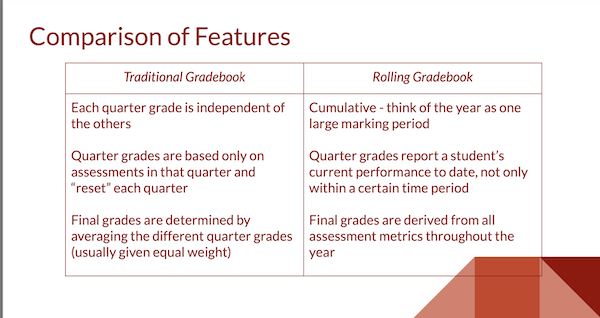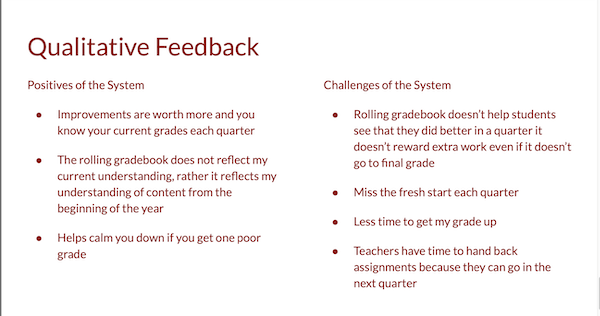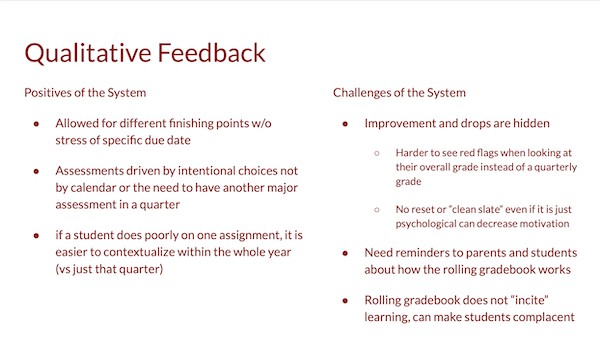District Presents Findings on the Rolling Gradebook: Parents Ask for Changes Soon
- Wednesday, 06 November 2024 12:36
- Last Updated: Thursday, 07 November 2024 15:13
- Published: Wednesday, 06 November 2024 12:36
- Wendy MacMillan
- Hits: 2844
 During the 2023-2024 school year Scarsdale High School piloted a new grading system aptly called the Rolling Gradebook, which veers from traditional reporting of quarterly grades to a focus on the accumulation of grades throughout the school year. Though the Rolling Gradebook was implemented with the intention to decrease stress and to foster a growth mindset among students, many in the community are questioning if the new system is reaching these goals. In an effort to demonstrate that they are listening to this feedback, SHS Principal Ken Bonamo and STA President Joe Vaughan gave a thoughtful and detailed presentation to the Board of Education aiming to provide a greater sense of understanding about the history of the work, the motivation to implement a new grading system, and a thorough review of how the Rolling Gradebook operates.
During the 2023-2024 school year Scarsdale High School piloted a new grading system aptly called the Rolling Gradebook, which veers from traditional reporting of quarterly grades to a focus on the accumulation of grades throughout the school year. Though the Rolling Gradebook was implemented with the intention to decrease stress and to foster a growth mindset among students, many in the community are questioning if the new system is reaching these goals. In an effort to demonstrate that they are listening to this feedback, SHS Principal Ken Bonamo and STA President Joe Vaughan gave a thoughtful and detailed presentation to the Board of Education aiming to provide a greater sense of understanding about the history of the work, the motivation to implement a new grading system, and a thorough review of how the Rolling Gradebook operates.
The presentation began with an overview of the history of work that led to the development of the Rolling Gradebook. Mr. Bonamo explained that the work began in 2015 when the District partnered with Stanford’s Challenge Success to better understand and foster meaningful well-being in the school culture. Through this partnership, work with the Tri-State Consortium, and research supported by Dr. Guskey, author of On Your Mark, SHS put together an Assessment Committee which used the results of a student survey to help actualize several meaningful changes at the high school level. Some of these changes, meant to reduce stress, include: no homework during breaks and no tests upon return, the formation of the Testing and Assessment Rescheduling Policy (TARP) and the implementation of No Testing Days, and the creation of the Profile of a Graduate.
In an email that he shared on October 11th, Bonamo described the research that has helped to inform the Rolling Gradebook initiative:
“The Assessment Committee has done a great deal of research about the rolling gradebook, guided in this work by Dr. Thomas Guskey, renowned author in the areas of assessment and grading. SHS also completed a faculty-wide read of his book On Your Mark and were fortunate enough to have Dr. Guskey visit with the Assessment Committee and High School Cabinet, and a number of faculty meetings were devoted to the topic.”
In his presentation, Bonamo outlined Rolling Gradebook Rationale explaining:
-Promotes a growth mindset and helps students understand setbacks within the larger context of the course
-Grades will illustrate long-term progress throughout the year, not just short-term achievement in each quarter
-Provides a more accurate reflection of the course grade at any given point in time
-Allows teachers to reduce the clustering of tests or large projects at the end of each quarter
-Ensures that assessments are weighted properly in relation to each other and other coursework completed throughout the year
-Allows teachers to plan units to end naturally and not get rushed due to quarter breaks
-Encourages teachers to plan for the year as a whole instead of by quarter
Before describing some of the issues that can arise when utilizing a quarterly grading system, Bonamo shared a slide comparing the Traditional Gradebook to the Rolling Gradebook.

Bonamo went on to explain, “The Assessment Committee administered student and teacher surveys after the end of the third marking period where respondents were asked to indicate if they would like us to adopt the rolling gradebook permanently or return to our traditional quarterly system. Respondents were also given an opportunity to provide qualitative feedback through an open text box.”
While a slight majority (45.9%) of those students who took the survey reported they would like to adopt the Rolling Gradebook, Bonamo recognized that this is not an overwhelming majority and that there are some aspects of the new grading system that deserve to be further analyzed.
In another slide Boanmo shared the qualitative feedback from the student survey:

Feedback from the survey given to teachers includes:

Bonamo also highlighted some of the main points garnered from parent feedback which aligns with the concerns shared by students and teachers. He also expressed regret for not including parent voices in the surveys last spring saying it was a misstep and promised parents will be included in the surveys administered in the spring of 2025. In addition to this correction, Bonamo assured the BOE that the Assessment Committee is actively considering the feedback and exploring some possible adjustments.
You can see the slides from this presentation here.
You can see Mr. Bonamo’s Rolling Gradebook FAQ communication here.
After the presentation, board members were afforded the opportunity to ask questions.
One question came from Amber Yusef who said she appreciated the history and context for the Rolling Gradebook.. She wondered however, given one of the rationales for the Rolling Gradebook is to prevent tests across the various subject matters from being bunched together, if that is truly working and if there is some way to keep track.
Mr. Bonamo shared that while the Rolling Gradebook does work to minimize the clustering of tests at the end of each quarter, there still tends to be some clustering of assessments before school breaks. Bonamo explained that this is the result of the natural rhythm of the school year and prevents students from having homework over the breaks or an assessment after a long break. He reported that students seem to generally prefer this approach.
Yusef also asked if teachers publish their breakdown of assessments and how much each assessment is worth at the beginning of the school year so that students know what they need to prepare for. She added that she appreciates this sort of structure and clarity and would like to see greater transparency for the students.
Vaughan explained that this varies from teacher to teacher but that all teachers provide students with a general idea of what their class will entail. He further explained that it is important for teachers to have the flexibility to bend their curriculum to meet any needs that might arise in their class. If parents are interested, they can ask their children to see the syllabus provided by each teacher.
Yusef added that a lot of the feedback the BOE has heard has centered around students having a rough start to the school year and feeling like they have to dig out from under the poor start which leaves them feeling as if they are faced with an uphill battle. Yusef said she would have liked to see an example of this scenario in the presentation and hopes they will include one in the Parent Information Session on Wednesday, Nov. 20.
Robert Klein expressed appreciation for the very informative presentation and noted that while making changes can be difficult, he feels more optimistic about the Rolling Gradebook.
BOE member Colleen Brown stated that Board members have received a lot of feedback from many members of the community and one repeated point of concern centers around the timely return of assessments. She said it is stressful for students to not be able to learn from one assessment before another assessment is due. She asked Bonamo if they have a plan to address this feedback.
Bonamo agreed that this is an important concern to address and explained that he and the Assessment Committee sees this as a separate issue. He went on to assure the BOE that he has asked all Department Chairs to have conversations with the teachers within their department. He has also asked them to establish a draft of department wide norms and practices which he hopes to be able to share out later this spring.
BOE member Ron Schulof expressed his disappointment with this answer saying that there doesn’t seem to be any urgency in trying to address a situation with which students are currently struggling. Schulof feels that the process is flawed and that waiting until spring for answers does not seem to be student centered. He added that students are struggling now, and said, “we should be finding solutions now.”
Board President Suzie Hahn closed out the discussion with a thoughtfully prepared statement:
“Thank you to Ken, Joe and Edgar for this presentation and to everyone tonight for the robust discussion. I appreciate the Assessment Committee’s work evaluating our grading system and continuing to seek ways to improve Wellness in our schools. Scarsdale continues its tradition of innovation and its place at the forefront of educational practices. I’d also like to thank all those who’ve taken the time to share their experiences and provide feedback for this discussion.
I think we are all in agreement that no child’s effort or worth can be summed up in a single grade - whether it’s a number, letter, or checkmark. Any gradebook we try to use to capture an idea of performance or mastery of material will have its inherent benefits and drawbacks.
Understanding what a grading framework can capture well and what its limitations are is critical in making it an effective learning tool. Because at the end of the day grades don’t just look back at a student’s past or even current performance but ideally, serves as an instrument to further learning and understanding of a student’s work so that they can improve and grow into that critical thinker and lifelong learner, the Profile of a Graduate.
Of course everything new needs to be continuously evaluated to ascertain if it’s accomplishing its set goals, to iteratively self-reflect, and pivot with improvements when necessary to the holistic benefit of our students.
Recent feedback that the Board has received from the Wellness Committee that struck me noted that it is really the students who are potentially already struggling with grades that are impacted the most by these changes in RGB. These are some of our most vulnerable students, as consistently strong students would not perceive much of a change at all between the two report cards. I’m not an educator, of course you’re the experts, but for me that'd be hard to look away from. I believe you spoke to this Joe but as you continue your work I trust that you plan to address their concerns and ensure that their mental health is protected. I appreciate your comment about the need for improving teacher-to-student communication practices and norms. I think that additional transparency will be invaluable. I would also love to look into an LMS to provide even greater transparency around student assessments. Thank you for keeping students at the center of your work.”
During the Public Comment period of the meeting, several people spoke on the topic of the Rolling Gradebook.
SHS PTA President Cindy Yau read from a prepared letter in which she first expressed her gratitude for the Assessment Committee’s willingness to listen to and consider parents’ feedback on the Rolling Gradebook. Later in the statement she noted, “Education is a collaboration between parents, students, and educators. Fostering a strong partnership between parents and the school is essential for the overall development and success of our students. While educators bring their professional expertise to the table, parents offer unique insights based on our experiences and observations of our children.
Given this, we believe that parent feedback on the RGB is crucial. Having worked closely with you and your administration, I am confident that you will ensure our voices are heard.
Thank you for your continued dedication to our students and community.”
An SHS student spoke expressing her concern about the manner in which the Rolling Gradebook surveys were conducted. In addition to several other points, the student pointed out, “These surveys were administered during a 10-minute homeroom, which did not give students sufficient time to think through their answers and develop nuanced responses that accurately reflected their opinions. The questions, aside from one at the end that asked for additional information, were not open ended and forced students into set responses without the opportunity to reflect more deeply and specifically.” She went on to advocate, “In the future, students should have more time to complete surveys and have a chance to write in ideas that they might not have had the chance to express.”
One of the parents who spoke started by thanking Mr. Bonomo and Mr. Vaughn for their presentation saying it was, “useful and insightful and I really appreciated them coming in.” Though she was grateful for their time and effort, she expressed, “I am disappointed at the lack of urgency that the administration seems to have surrounding Rolling Gradebook and I urge them to reconsider the timeline. Addressing some of the issues with Rolling Gradebook in the spring is frankly just too late for many students who may be struggling now. I respect the fact that Mr. Vaughn took the time to talk to his struggling student but not all teachers will do the same and not all students are comfortable seeking out help.”
The parent went on to express, “I met with Mr. Bonomo a few weeks ago and he mentioned to me that numerical reporting of grades could be stressful. However, what’s even more stressful is not knowing that your grade might be an 83 as opposed to an 86 going into the final exam, which, under rolling gradebook, would show up on the report card as a solid B. Reporting the numerical rolling grade on the report card would be a very simple fix and permit a child to see upward and downward trends in their grades. It would also provide parents with the useful information to identify if their child was struggling. Teachers need to calculate the quarterly letter grade using the numerical number anyway so reporting this numerical rolling grade should be relatively easy. As I have repeatedly said before, there are emotional and real mental health issues with the way grades are being reported under the current rolling gradebook. I respectfully ask the administration to address the issues with Rolling Gradebook now. Not wait until the spring.”
While the comprehensive presentation worked to help many of the meeting’s attendees better understand the worthy and researched-based motivations for implementing the Rolling Gradebook and some of its benefits,concerns remain.
What was also made clear is that the Assessment Committee is aware of these concerns and in some cases, is actively working to consider possible adjustments. One adjustment that has already been made is increased communication with the parent body. In addition to the presentation at the BOE meeting, and the Rolling Gradebook FAQ shared in October, Bonamo will hold a Rolling Gradebook Information Session on Wednesday, November 20th.







